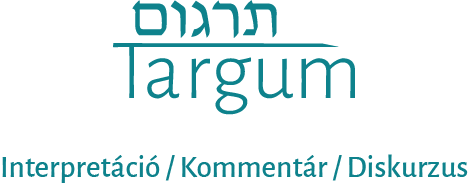Bacsó Beáta: A “felelős ember” egzisztencialista fogalma Karinthy Frigyesnél a modern és a posztmodern határán
Targum, 3, 2023. 206−225.
DOI: 10.56664/targum.2023.3.9
Karinthy Frigyes, a magyar és egyben a magyar-zsidó irodalom legkiemelkedőbb alakja, a huszadik századelőn pontosan érzékeli a szekularizálódó, épp ezért az egzisztenciálisan szorongó ember létbevetett magára maradottságát, a lét felelősségének az individuumra nehezedő súlyát. Ennek megfelelően regényeiben, novelláiban, esszéisztikus írásaiban megjelenik a „felelős ember”, mely messiás-figuráiban nyilvánul meg. Jelen tanulmányomban próbálom elhelyezni Karinthy „felelős emberét” az egyetemes filozófiai gondolkodás mentén; Descartes gondolkodó, felelős, modern emberétől, Sartre és Camus humanista egzisztencialista filozófiájának felelős ember fogalmáig.
A huszadik századelő, két nagy szellemi áramlat, a nietzschei filozófia és a freudi pszichológia hatásának légkörében zajlik. Mindkét áramlat a posztmodern életérzést, gondolkodásmódot előlegezi, melynek társadalmi, lélektani és etikai következményeit a magyar irodalmon belül főleg a nyugatosok dolgozták fel műveikben, ahogy Karinthy is. Épp ezért vizsgálom, hogy „felelős ember” fogalma hogyan születik meg a modern és a posztmodern határán.
In the the border of the modern and the postmodern: Frigyes Karinthy’s existentialist concept about the „responsible man”
On the early twentieth century Frigyes Karinthy, the most outstanding figure of Hungarian and Hungarian-Jewish literature, sensed exactly right the loneliness of the secularized and, consequently, existentially anxious man with his throwness (Geworfenheit), and the weight of existential responsibility lying on the individual.
Accordingly in his novels, short stories and essays the “responsible man” appeared manifesting himself in his messianic figures. In the present paper, I try to place Karinthy’s “responsible man” alongside the universal philosophical thinking; from Descartes’ modern, thinking, responsible man to the responsible man of the humanist existentialist philosophy of Sartre and Camus.
The early twentieth century was basically influenced by two great intellectual currents: Nietzschean philosophy and Freudian psychology. Both currents anticipated the postmodern sense of life and way of thinking; of which the social, psychological and ethical consequences have been elaborated upon within Hungarian literature, mainly by the “Nyugatosok” (Westerners), as by Karinthy too. That is why I examine how his concept of a “responsible man” was born on the border of the modern and the postmodern.
Bókay Antal: A posztmodernitás szellemi ősforrásai. In: Irodalomtudomány a modern és posztmodern korban. Budapest: Osiris, 2001.
Camus, Albert: Nietzsche és a nihilizmus; Nihilizmus és történelem. In: Uő: A lázadó ember. Budapest: Nagyvilág, 1999.
Erdődy Edit: Világkép és ábrázolásmód Karinthy Frigyes: Holnap reggel c. drámájában. In: Angyalosi Gergely (szerk.): Bíráló álruhában, Tanulmányok Karinthy Frigyesről. Budapest: Maecenas, 1990.
Erdős Iván: „»Legenda az ezerarcu lélekről« Karinthy Frigyes emlékének.” Ujság, 1939. szeptember 1.
Freud, Sigmund: Egy illúzió jövője. (Fordította: Dr. Schönberger István.) Budapest: Bibliotheca, 1945.
György Péter: Állatkert Kolozsváron – Képzelt Erdély. Budapest: Magvető, 2013.
Heller Ágnes: „Mi a posztmodern – húsz év után.” Alföld– EPA, 54 /2, 3-15. 2003. https://epa.oszk.hu/00000/00002/00081/heller.htm. (letöltés ideje: 2020. február 01.)
Karinthy Frigyes: Az ezerarcu lélek. Budapest: Az Érdekes Ujság ingyenes karácsonyi melléklete 1916a.
Karinthy Frigyes: Holnap reggel. Békéscsaba: Tevan, 1916b.
Karinthy Frigyes: Telma Titusz kiáltványa. In: Ascher Oszkár (szerk.): Karinthy Frigyes kiadatlan naplója és levelei. Budapest: Nyugat, 1938a.
Karinthy Frigyes: A reformnemzedékhez. Hevenyészett elszámolás a költőre bízott talentomról. In: Üzenet a palackban. Budapest: Cserépfalvi, 1938b.
Karinthy Frigyes: Mennyei Riport. In: Ungvári Tamás (szerk.): Mennyei Riport, Utazás a koponyám körül. Budapest: Szépirodalmi Könyvkiadó, 1977.
Karinthy Frigyes: Van-e túlvilági élet? In: Ungvári Tamás (szerk.): Címszavak a Nagy Enciklopédiához II. Budapest: Szépirodalmi Könyvkiadó, 1980.
Karinthy Frigyes: Az ezerarcu lélek – Telma Titusz kiáltványa. Bacsó Beáta tanulmányával. Sajóvelezd: Sáránszki, 2011.
Karinthy Márton: Ördöggörcs I. Budapest: Ulpius-ház, 2003.
Kosztolányi Dezsőné Harmos Ilonka: Karinthyról. Budapest: Noran, 2004.
Kőrizs Imre: „A költő Karinthy. Tanulmány versben.” Holmi. 2011. vol. 23. 1220-1222. http://www.holmi.org/2011/10/korizs-imre-a-kolto-karinthy (letöltés ideje: 2020. február 1.)
Lacan, Jacques: The Four Fundamental Concepts of Psycho-Analysis. (Translated: Alan Sheridan.) New York – ּLondon: W. W. Norton and Company, 1981.
Levine, Steven Z.: Lacan Reframed. London: I.B. Tauris, 2008. DOI: https://doi.org/10.5040/9780755696505
Nietzsche, Friedrich: Anzeichen höherer und niederer Kultur. In: Menschliches, Allzumenschliches. Ein Buch für freie Geister. 1878. https://www.textlog.de/21867.html (letöltés ideje: 2021. szeptember 16.)
Nietzsche, Friedrich: Emberi – túlságosan is emberi I. Szeged: Szukits, 2000.
Nietzsche, Friedrich: Morgenröte. Gedanken über die moralischen Vorurteile. Berliner Ausgabe: Edition Holzinger, 2016a. http://www.zeno.org/nid/20009245235 (letöltés ideje: 2023. március 11.)
Nietzsche, Friedrich: Die »Vernunft« in der Philosophie. In: Götzen-Dämmerung oder Wie man mit dem Hammer philosophiert. Berliner Ausgabe: Edition Holzinger, 2016b. http://www.zeno.org/nid/20009256199 (letöltés ideje: 2023. március 11.)
Nietzsche, Friedrich: Igazságról és hazugságról nem-morális értelemben. Budapest: Attraktor, 2018.
Nietzsche, Friedrich: Die fröhliche Wissenschaft. La gaya scienza. Berliner Ausgabe: Edition Holzinger, 2016c. http://www.zeno.org/nid/20009251758 (letöltés ideje: 2020. február 1.)
Nietzsche, Friedrich: Az Antikrisztus. Máriabesnyő – Gödöllő: Attraktor, 2007.
O’Brien, Eugen: “Desidero Ergo Sum (I Desire Therefore I Am): Towards a Psychoanalytic Reading of the Advertising of Perfume.” Irish Communication Review. 2016. vol. 15. 201-236. DOI:10.21427/D79G63
Sartre, Jean-Paul: Descartes a szabadságról. In: Uő: A szabadságról. Budapest: Kossuth,1992.
Sartre, Jean-Paul: Az ego transzcendenciája, Debrecen: Latin betűk, 1996.
Scholem, Gershom: The Messianic Idea in Judaism. And Other Essays on Jewish Spirituality. (Translated: Michael A. Meyer, Hillel Halkin.) New York: Schocken Books, 1971. https://web.ics.purdue.edu/~akantor/readings/scholem_messianic_judaism.pdf (letöltés ideje: 2021. szeptember 21.)
Scholem, Gershom: A messiás-eszme a zsidóságban. In: Uő: A kabbala helye az európai szellemtörténetben – Válogatott írások I. (Fordította: Berényi Gábor.) Budapest: Atlantisz, 1995.
Schrift, Alan D.: Nietzsche and the question of interpretation: between hermeneutics and deconstraction. New York: Routledge, 1990.
